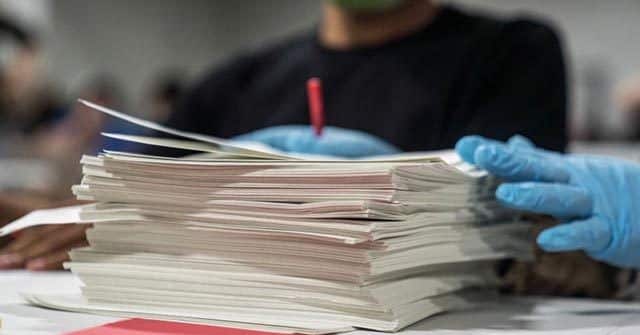Georgia asked a federal court on Wednesday to dismiss the U.S. Department of Justice lawsuit that alleges the state’s 2021 Election Integrity Act (SB 202) violates Section 2 of the Voting Rights Act, which prohibits racial discrimination.
Georgia Attorney General Chris Carr (R-GA) has deputized a powerhouse boutique law firm from D.C., Shaerr Jaffe, to work with his office defending the Peach State in this litigation, with two former Supreme Court law clerks working on this case, along with a third partner who has argued before the Supreme Court.
Lead outside counsel Gene Shaerr–a seasoned Supreme Court litigator who clerked for Justice Antonin Scalia, argued in the motion to dismiss:
This action by the U.S. Department of Justice (DOJ) is a politicized intrusion into the State of Georgia’s constitutional authority to regulate the ‘time, place, and manner’ of its elections, Georgia’s election laws, as recently amended by SB 202, are reasonable, nondiscriminatory, and well within the mainstream of election laws across the
country.
“As a whole, Georgia law ‘generally makes it very easy to vote’,” the court filing states, adding as a reference point the language from the majority opinion in the recent Brnovich v. Demcratic National Committee decision in which the Court held Arizona’s laws that prohibit out-of-precinct voting and ballot harvesting do not violation Section 2 of the Voting Rights Act.
Carr and Shaerr’s motion continued:
SB 202 implements lessons learned by state and local elections officials through the challenge of administering an election during a global pandemic. During the 2020 election cycle, the Georgia Secretary of State and State Election Board undertook temporary, emergency measures to protect the health and safety of voters amidst unprecedented circumstances.
SB 202 makes permanent some of the emergency measures that proved successful, while shoring up the security of the State’s numerous and accessible methods of voting. At each turn, Georgia’s General Assembly sought to increase voter access and voter confidence—making it “easy to vote and hard to cheat.”
Compared to prior statutory law, SB 202 significantly increased voter access. Rather than allowing Georgia’s officials to implement the commonsense provisions of SB 202, DOJ asks this Court to undo the considered judgment of Georgia’s elected representatives. And DOJ does so even though many of the provisions of SB 202 that DOJ calls “discriminatory” and even “racist” are the law in many states, including Delaware, New York, Rhode Island, New Jersey, Maryland, and Wisconsin. Yet DOJ is not suing those states, nor has it sued others controlled by Democrats that have laws far more restrictive than Georgia’s. This merely underscores why this lawsuit should be dismissed: “States—not federal courts—are in charge of setting [the] rules” for the electoral process.
“Putting aside DOJ’s transparently political interference with Georgia’s constitutional authority, the complaint must be dismissed-” for three reasons, Georgia’s attorneys argued:
- First, DOJ’s civil complaint rests entirely on an alleged discriminatory intent or purpose rather than alleging discriminatory results.
- Second, even if intent was sufficient to violate Section 2, the complaint fails to allege facts showing discriminatory intent because it fails to allege an act or statement from any Georgia legislator suggesting such an intent behind SB 202.
- Third, DOJ’s complaint cannot survive the Supreme Court’s recent decision in Brnovich, which rejected many of the arguments on which DOJ relies here. Brnovich emphasized that Section 2 claims must be assessed under the “totality of circumstances,” noting that voters must “tolerate the usual burdens of voting” and that “[m]ere inconvenience cannot be enough to demonstrate a violation of [Section] 2.”
Regardless of whether the case is decided at the dismissal stage and which party prevails in the trial court, the losing party is expected to take the matter to the U.S. Court of Appeals for the Eleventh Circuit, which is also housed in the Atlanta courthouse.
The case is United States v. Georgia, No. 1:21-cv-2575 in the U.S. District Court for the Northern District of Georgia.






